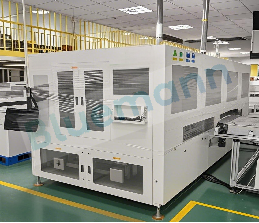In modern photovoltaic (PV) module manufacturing, junction boxes play a vital role in ensuring electrical connectivity, safety, and durability. The junction box acts as the interface between the solar panel and the external circuit, protecting connections while enabling efficient energy transmission. To guarantee strong and reliable bonding between conductors, the junction box welding machine has become an indispensable piece of equipment in solar production lines.

A Bluemann junction box welding machine ensures that welding is precise, consistent, and adaptable to different types of junction boxes. Whether used with single-box or three-piece junction boxes, and whether welding with or without tinning, this machine provides manufacturers with flexibility, efficiency, and superior reliability.
What Is a Junction Box Welding Machine
A junction box welding machine is specialized equipment designed for automatically welding junction boxes onto solar modules or related devices. The machine ensures stable connections between cables and junction boxes, guaranteeing high conductivity and minimizing electrical losses.
Unlike manual welding, which may result in inconsistent joints or higher defect rates, automated welding machines integrate advanced heating, pressure control, and positioning systems. This automation ensures uniform welds across mass production lines, improving both quality and efficiency.
Working Principle of the Junction Box Welding Machine
The working principle of a junction box welding machine can be summarized as follows:
Positioning
The machine automatically positions the junction box to align with the cable or busbar. Precision sensors ensure accuracy to avoid misalignment.
Heating and Welding
Using controlled heat and pressure, the machine melts and bonds the conductive materials. Depending on the process, welding may occur with or without tinning, offering manufacturers flexibility for different production needs.
Cooling and Solidification
After the weld is formed, it cools and solidifies under controlled conditions, creating a strong and stable joint resistant to mechanical stress and temperature fluctuations.
Quality Verification
Many modern machines integrate visual inspection and electrical testing systems. These ensure that every weld meets quality standards before the junction box is approved for assembly.
Key Features
The junction box welding machine offers multiple advantages that make it an essential part of PV module production:
-
Compatibility: Works seamlessly with both single-box and three-piece junction boxes.
-
Flexible Welding Options: Can perform welding with or without tinning, adapting to different material requirements.
-
High Precision: Equipped with intelligent positioning and heating systems for accurate welds.
-
Automation: Reduces manual intervention, lowering labor costs and minimizing human error.
-
Efficiency: Capable of high-speed production while maintaining consistent quality.
-
Durability: Designed to withstand continuous operation in demanding industrial environments.
Applications of Junction Box Welding Machines
1. Solar Module Manufacturing
The primary application is in photovoltaic panel assembly. The machine ensures robust electrical connections between the module’s internal circuitry and the external output cables, directly influencing energy transmission efficiency and long-term reliability.
2. Electronic Components
Beyond solar, junction box welding machines are also used in electronic assembly lines where consistent and durable welds are essential.
3. Automotive and Energy Storage Systems
As electric vehicles and energy storage technologies grow, reliable junction box welding ensures safety and efficiency in battery packs and power distribution systems.
Conclusion
The junction box welding machine plays an essential role in modern solar module production and other electronic assembly industries. Its ability to deliver precise, consistent, and reliable welds ensures strong connectivity, improved efficiency, and enhanced product safety. With compatibility for single-box and three-piece junction boxes, and the flexibility to weld with or without tinning, the junction box welding machine provides manufacturers with a versatile solution that meets the evolving demands of renewable energy and electronic industries.
By adopting this technology, manufacturers can achieve higher productivity, reduced costs, and improved long-term reliability, ultimately supporting the global push toward sustainable and efficient energy solutions.
https://www.bluemannsolar.com/working-principle-and-application-of-junction-box-welding-machine.html










Comments (0)